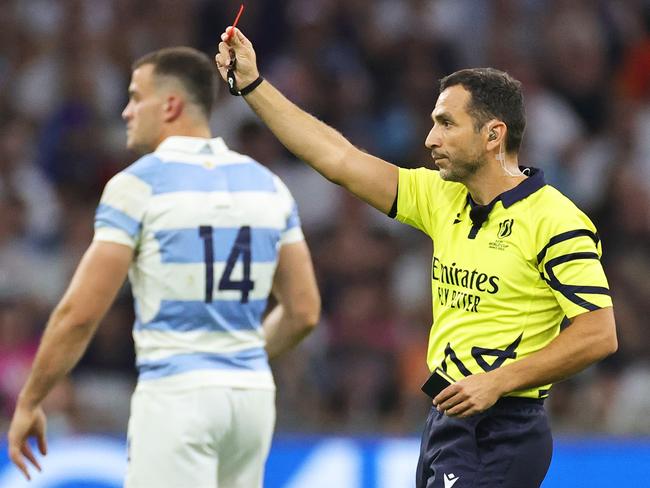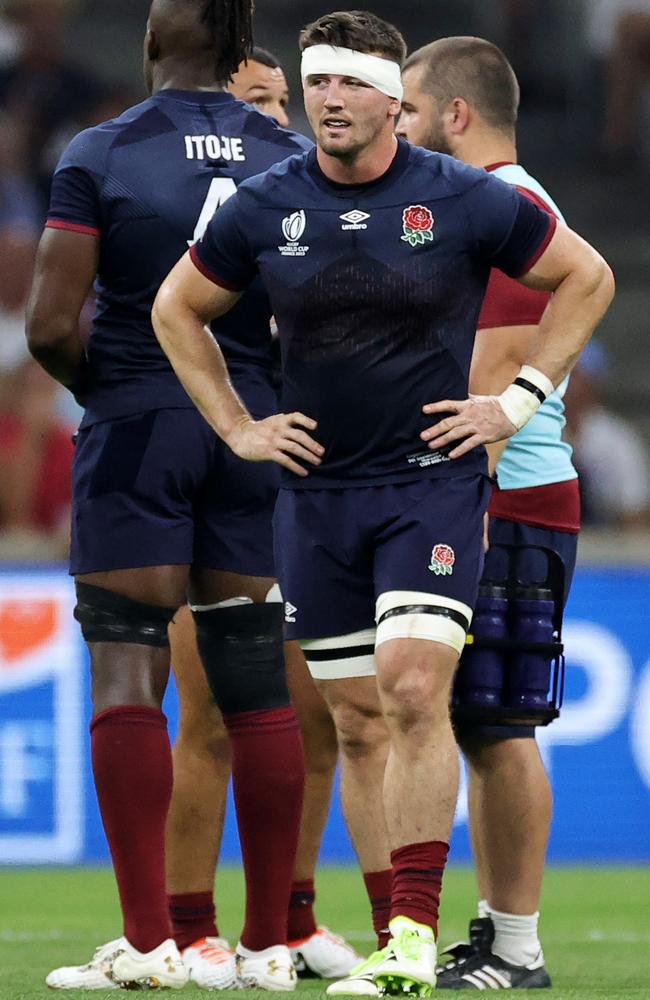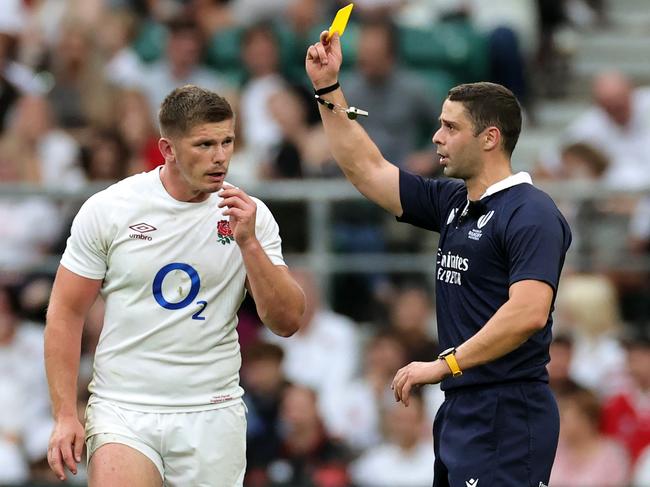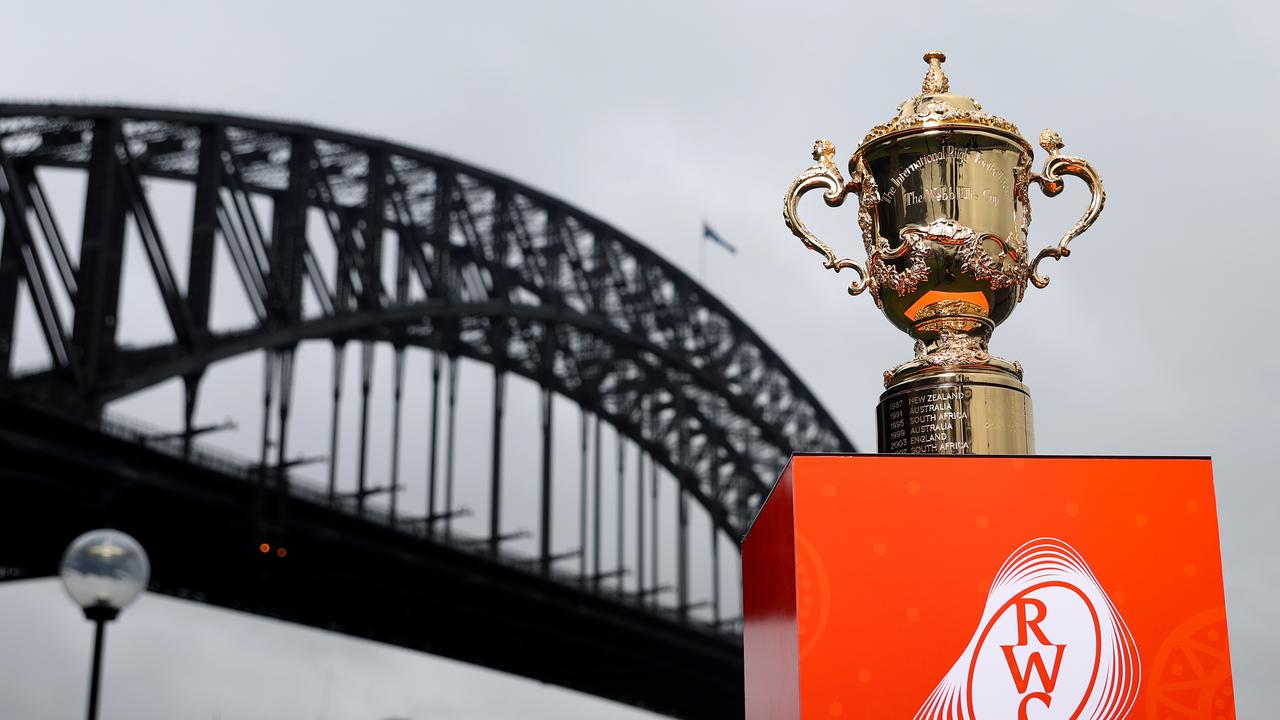Card chaos threatens to ruin imperfect rugby’s big moment, as World Cup players walk fine line
A stack of cards in the Rugby World Cup’s opening encounters have brought confusion rather than clarity, and risk blacking out the game’s greatest shop window, writes ALEX LOWE.

World Cup
Don't miss out on the headlines from World Cup. Followed categories will be added to My News.
Welcome to rugby in 2023, a sport trying to attain perfection on a field of chaos. It is an impossible task. Instead of clarity, it brings confusion. After an exciting opening weekend of the World Cup, in which England rediscovered how to win and Wales scraped past Fiji in a thrilling game on Sunday night, it is the refereeing and not the rugby that is dominating so many conversations.
The letters department at The Times has been inundated with readers questioning why Tom Curry, the England flanker, was sent off against Argentina for a head-on-head collision when three other similar incidents over the weekend warranted a yellow card at most.
Throw into the mix Matthew Carley’s handling of the dramatic final stages of the Wales-Fiji game, when he appeared to be far more lenient to Warren Gatland’s men than the Pacific Islanders, and referees have been getting it in the neck.
The World Cup is rugby union’s great shop window but casual viewers – or at least those without a law degree and intimate knowledge of the dangerous tackle framework – are at risk of being locked out.
To recap the weekend, Curry received the fastest red card in World Cup history when he collided with Juan Cruz Mallia, the Argentina full back, just as he landed from a catching a ball in the air.
It looked to many like a rugby incident, like an accidental collision which resulted in both men receiving treatment for cuts. But all decisions are then based on outcome only, with no consideration given to a player’s intent. Curry was deemed guilty of dangerous foul play and dismissed.
It would be a surprise if Curry, via Richard Smith KC, who has been England’s brief for 20 years, did not challenge the red card at his disciplinary hearing in Paris tonight (Tuesday). He will likely argue that mitigation should have been applied given the sudden change in height of the ball carrier. It would have worked for Owen Farrell, the England captain, after he was sent off in a warm-up game against Wales, had he been attempting to make a legal tackle in the first place. Curry was.

Meanwhile, Jesse Kriel, the South Africa centre, received no on-field punishment for what looked to be a head-on-head collision with the Scotland loose forward Jack Dempsey. Kriel is not expected to be cited either. It is understood that the multiple replay angles, which were not used in the original broadcast, could not confirm there was head-on-head contact.
Martin Sigren, the Chile captain, was shown a yellow card for a similar incident to Curry’s in his team’s defeat by Japan. To add to the confusion, Nic Berry, the referee, told Sigren it was foul play because he had been upright, which was incorrect. Tackling a player upright is not illegal, which is part of the problem here. We will come to that.
Sigren did not have his yellow card upgraded to red because the foul-play officials who operate in World Rugby’s so-called bunker and reviewed the incident decided the first contact had been with the body.
An incident involving Dan Biggar, the Wales fly half, in the game against Fiji will be looked at by the citing commissioner, who has 36 hours to decide whether a red card should have been shown. There were a couple of other potential shoulder-to-the-head challenges in that game too, including by Will Rowlands on Fiji’s Luke Tagi.
Got all that? Welcome again to rugby in 2023, a sport facing legal action from former players with dementia tying itself in knots in a bid to demonstrate it is taking action to reduce head injuries.

It does not appear to be working. World Rugby’s own research shows that upright, front-on tackles with force are the most dangerous in the game. For years, they have used red cards as a way of trying to force players to go lower and maintain it is the best form of deterrent.
But upright front-on tackles with force are also extremely effective and not illegal unless there is a minor misjudgment in the heat of a Test match which results in head contact.
Players will keep taking the risk. Farrell addressed exactly that issue last summer, after Saracens had defeated Harlequins in the Gallagher Premiership semi-final, a game that featured four yellow cards for dangerous tackles.
“A few of them tackles are them just trying to be dominant. There is no malice in it,” he said. “We know what we can and can’t do, but you still have to have enough intent to go forward in your defence.
“If you are constantly being passive you probably won’t get picked next week. It’s a fine line and I don’t think people quite understand when it gets slowed down on TV how quick those decisions are [on the field].”
We have written this before but players find themselves caught between what the game demands of them on the field in order to win matches and what the lawmakers demand of them in order to make the sport appear safer.
Those are the small margins referees and their back-up team of six are having to police.
“Rugby is not black and white, there are a lot of things that are grey,” Nika Amashukeli, the Georgian World Cup referee, said.
“The game is now decided on centimetres. The game is filmed by 42 cameras with slow-mo replay. That’s part of life, unless you want robots on the field.”

The end game here appears inevitable if the focus remains on reducing head contact. The sternum-height tackle law that has been introduced into community and schools rugby as a trial this year is expected to be fast-tracked into the professional game before the next World Cup. That would create greater space between the legal tackle height and the head.
As for Carley’s performance, Wales were penalised on multiple occasions for offences on their own line without a yellow card. Fiji did not receive the same leniency. It felt to many like a mistake.
Given the job of a rugby referee is to manage 80 minutes of organised chaos, where little is black and white, it would be interesting and beneficial to understand how he judged those situations.
As Amashukeli says, referees will make mistakes. That will not change even with a back-up team of five, which they now have at Test level. But to suggest Carley was guilty of bias, as some have, is outrageous.
Dylan Hartley, the former England captain, made the fascinating point that the natural deference Fijians have to authority – their “respect and humility” – meant Carley was not “pressed, reminded, questioned, leant on and ultimately held accountable”.
The introduction of a professional team on Fiji has benefited their game hugely. Perhaps referee management is the next step. And, of course, if Semi Radradra had not dropped the ball with the tryline at his mercy, Fiji might have won anyway.
More Coverage
Originally published as Card chaos threatens to ruin imperfect rugby’s big moment, as World Cup players walk fine line




